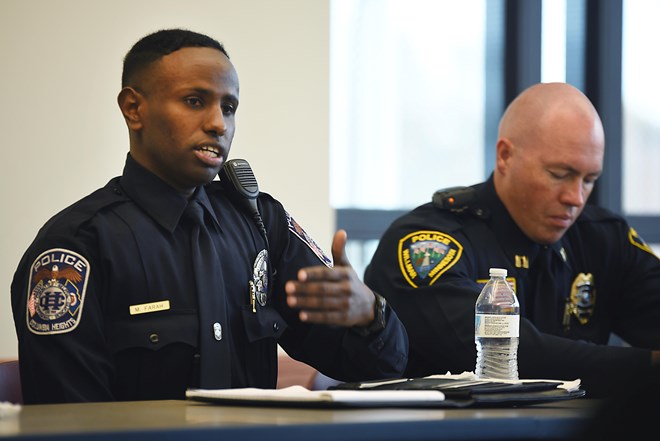
Thursday, November 03, 2016
By Gretchen Brown

Columbia Heights Police Officer Mohammed Farah, left, talks Wednesday about the actions people in the community can take in order to better understand someone from a different country. Briana Sanchez / Tribune
WILLMAR — As a police officer, Mohammed Farah is used to bridging the gap between the public and law enforcement.
But as an East African immigrant who moved to Minnesota as a teen, the Columbia Heights officer knows just how wide that gap can be.
"Sometimes it's hard. It's a headache," he said.
When he arrived at the Columbia Heights Police Department two years ago, he said, the community was "hungry for somebody who can communicate."
Farah led a conversation Wednesday afternoon at the Willmar Public Library, saying he believes cultural understanding and communication play a big part in public safety.
The talk, which lasted about an hour and a half, was organized by the Willmar Police Department. About 30 people filled the small room in the upstairs of the library, many sticking around after the formal wrap-up.
"This dialogue we have today is a good start," Farah said. "Not a lot of agencies do this kind of outreach. ... They wait until something big happens."
It was more of a conversation than a seminar. Attendees were given the chance to ask things they were simply curious about.
Some questions were more broadly cultural. Others centered specifically on police work. Several times, the conversation in the audience became back-and-forth, free-flowing dialogue.
When Stephen Deleski suggested that local cultural centers like the mosque were not aiding cultural integration as much as they could, pointing to churches as good examples, another member of the audience, Abdirizak Mahboub, jumped into the conversation.
"Everyone wants to integrate. It's very important, and part of life to integrate your local community," Mahboub said. "It takes time for integration. It takes time for these institutions to develop where they can help integrate."
Willmar Police Chief Jim Felt and Capt. Michael Anderson answered some Willmar-specific questions from the audience.
One man, through a translator, asked if it was legal for police to follow him while he is driving. Anderson explained that Willmar police will sometimes follow a vehicle if officers see a traffic violation or believe a driver is intoxicated.
Farah said there's a big difference between policing methods in east African communities and the United States. "Police are looked at as corrupted people, somebody that takes bribes," Farah said. "This is not how this country works. It takes a little time to adapt to that kind of environment."
Abdullahi Olow, of Willmar, helped with some of the translation Wednesday. He also had a part in organizing the talk and spreading the word.
Olow said people he talked to were excited about the idea, but many could not make it because of the weekday afternoon timing.
Personally, he took a day off, using a substitute driver for his medical transportation business so he could help out.
"That's how important this was for me," Olow said.
Felt and Anderson said the Willmar Police Department is trying to do more community outreach, something Farah's department in Columbia Heights excels at.
Farah visited the Willmar Police Department for a private instructional talk Wednesday night with just police officers about policing in a diverse community.
It's something the department sometimes struggles with, Anderson said. U.S. Census data indicates about 10 percent of Willmar residents are foreign-born. But the Willmar Police Department has no Somali officers.
Talking about that with the Columbia Heights police chief helped connect Anderson with Farah. Farah is also the president of the Somali American Police Association and has given similar talks in other communities, including Faribault.
Anderson did not view Wednesday's talk as a end-all solution to all problems, but said it was a great start.
"Any time there's dialogue, it's a good thing," Anderson said.
He said he would love to have more people from Willmar's immigrant community enter the law enforcement field.
Until then, it's especially important for everyone with a stake in the community to have a voice in the conversation, Farah said.
"Everybody needs to be invited to the table, because at the end of the day, everyone has something to say," Farah said.